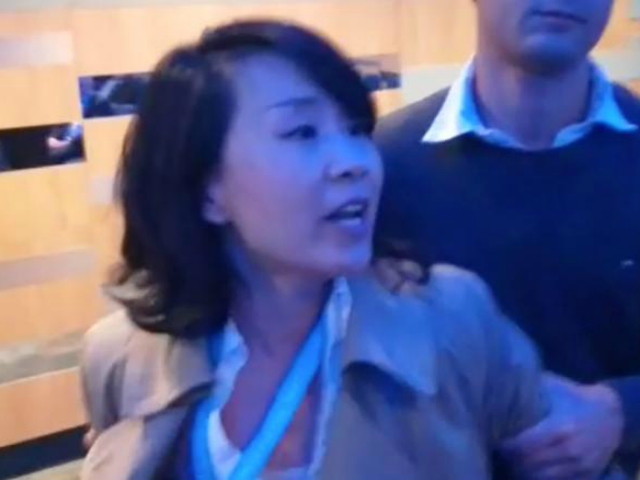One of China’s many double standards involves the behavior of reporters. Foreign reporters are expected to conduct themselves with humility and exquisite good manners in China, while Chinese reporters abroad can become rather energetic at press conferences.
Such was the case with Kong Linlin of the state-run China Global Television Network (CGTN), who erupted in a tirade at the UK Conservative Party Conference on Sunday and was forcibly removed.
Kong was covering a discussion about the “erosion of freedom, the rule of law, and autonomy in Hong Kong” when she suddenly began yelling at the panelists, denouncing them as “traitors” and “fake Chinese.” The panel included several democracy activists from Hong Kong.
“You’re a liar! You’re anti-China! You’re trying to separate China! You’re all puppets of the West!” she shouted at the panel after one of the human-rights advocates insisted he is not, in fact, “anti-China.”
A young volunteer asked Kong to calm down and then asked her to leave the event, but she refused and slapped him twice. Another volunteer stepped in and helped the enraged journalist to the door.
“Oh, how ‘democratic,’ the UK!” she snarked as she was ejected.
The Chinese embassy in London strongly objected to Kong’s treatment.
“The fringe event of the Human Rights Committee of UK Conservative Party during the Party’s annual conference boosted the arrogance of the anti-China separatists. It was a cause for grave concern and strong objection,” an embassy spokesperson said on Monday.
“China firmly opposes interference in Hong Kong’s internal affairs by anyone or any organization in any form. Any attempts or actions that advocate Hong Kong independence will be in vain,” the spokesperson added.
“In a country that boasts freedom of speech, it is puzzling that the Chinese journalist should encounter obstruction in such a way, and even assault at the fringe event when she simply raised a question and expressed her opinions. This is completely unacceptable,” the embassy statement concluded, adding a demand for the organizers of the Conservative Party event to apologize to Kong.
Needless to say, Chinese media have completely avoided mentioning that Kong slapped anyone. Reports in China universally describe her as the party that was “assaulted” or “obstructed” during the altercation.
China’s double standard creates certain optics. A Western journalist who tried anything remotely similar to what Kong did would have a very bad day, to say the least, and would either leave China very quickly or not at all. The theory behind authoritarian states meddling in Western politics is that free countries are uniquely vulnerable to chaos operations, while the authoritarians have brutally effective defenses against outside interference.
Writing at Foreign Policy on Monday, James Palmer – who has experience working for Chinese media operations – noted that Chinese programming for Western consumption tends to reward reporters for “whiny nationalism” because it makes them more attractive to the far more prestigious domestic media operations.
As Palmer explained it, China’s Western media operations like CGTN are much smaller and less freewheeling than operations like Russia’s RT.com or Qatar’s Al Jazeera English. The staff is more concerned with avoiding the wrath of China’s stultifying bureaucracy than taking risks to attract foreign viewers. The best way to draw positive attention from the Chinese political hierarchy is to pick a fight with foreigners and become a martyr to Chinese patriotism:
Full-blown nationalism, sincere or not, has long been a route to potential exposure for Chinese wannabe celebrities—usually not on state media itself, but using their position as a platform to attempt to drum up a social media frenzy. (I’ve had a CGTN host, who I will mercifully leave unnamed, try to do this by attacking me on Twitter and reposting parts of the exchange on his Chinese social media accounts; to my amusement, his efforts flopped.) As China’s relations with the West further sour, this mood of aggressive victimhood may become more appealing.
This seems to be what Kong, who has a record of attacks on Western media’s reporting in China, was trying to do. She was likely inspired by a recent incident in Sweden, where a Chinese family’s anger after the police removed them from a hotel for being belligerent to staff went viral on Chinese media and resulted in the Chinese Embassy demanding an apology. There’s a good chance her behavior wasn’t real outrage at those dastardly separatists on the panel, but a deliberate performance—one that, as the embassy’s response shows, is well in tune with the mood of the moment.
Even if Kong fails to go viral, it will still give her clout within the CGTN hierarchy, making her more likely to be promoted and less vulnerable to political attacks from others. Other CGTN and CCTV journalists have already posted in support of her, disingenuously describing her behavior as asking questions, as have figures like Global Times editor Hu Xijin. This may be genuinely misinformed support of a colleague, but more likely it’s bolstering their own position within the often viciously cut-throat internal politics of state media.
Kong’s bid for attention seems to have worked, as the BBC reported “tens of thousands” of Chinese Internet users have “praised her for defending Chinese sovereignty over Hong Kong.”
“However, many of these comments appear to have been left by government-paid propagandists,” the BBC added. In other words, Kong reached the only audience in China that really matters.

COMMENTS
Please let us know if you're having issues with commenting.